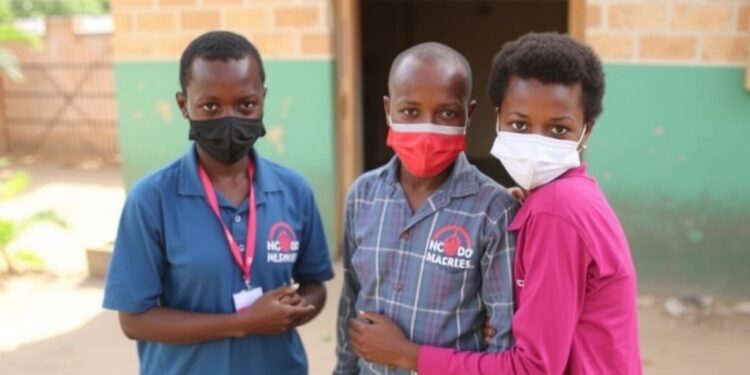A major public health challenge persists in the global effort to eliminate rubella and measles, primarily due to the fragmentation of commitment across nations. Despite the existence of effective vaccines, the coordinated global resistance to these diseases remains inconsistent. The recent Policy Forum by experts Matthew Ferrari and William Moss sheds light on the forthcoming recommendation from the World Health Organization (WHO) to universally introduce rubella-containing vaccines (RCVs) into childhood vaccination programs worldwide. This initiative specifically targets the 19 countries that have yet to adopt RCVs, highlighting an urgent need for these nations to join the global vaccination effort.
The decision to recommend RCVs signifies a pivotal moment in the battle against congenital rubella syndrome (CRS), a severe condition that imposes staggering health risks, particularly when rubella infection occurs during pregnancy. CRS leads to a host of debilitating birth defects and increases infant mortality rates. Vaccination against rubella, a relatively benign illness in the general population, becomes critical in protecting vulnerable groups. By combining RCVs with the widely used measles vaccine, there is potential for considerable enhancement of global immunity against both diseases, edging the world closer to their eradication.
Many higher-income countries have embarked on successful RCV initiatives, demonstrating leadership in addressing rubella. Unfortunately, poorer countries often face dire economic constraints that hinder their vaccine implementation efforts. These nations have historically relied on external funding to introduce RCVs. The authors, Ferrari and Moss, argue that the WHO’s upcoming endorsement removes a significant barrier for the remaining 19 countries, many of which are situated in Africa and other regions within the Global South. The support from WHO not only facilitates the introduction of RCVs but is also crucial in ultimately achieving widespread immunization coverage.
Ferrari and Moss emphasize the necessity of collective action from the international community alongside non-governmental organizations (NGOs) to advocate for the integration of RCVs into national vaccination schedules. Stakeholders must collaborate to create compelling incentives geared towards implementing robust vaccination campaigns, particularly in regions where these vaccines are critically needed. By pooling resources and expertise, there is an opportunity to elevate vaccination efforts in underserved communities, thus ensuring that vulnerable populations are adequately protected from rubella and its dire consequences.
The looming threat of rubella and measles resurgence in the Western Hemisphere adds an alarming dimension to the current public health landscape. As vaccination support declines and political tensions rise, the potential for an outbreak of these diseases becomes more tangible. The authors point to significant factors such as the United States’ withdrawal from WHO and the prevailing discussions regarding cuts to international health funding. These developments cast a shadow over what could be an extraordinary global public health triumph—eradicating rubella and measles altogether.
The triumphs achieved through vaccination campaigns are at risk if these concerning trends continue unchecked. Widespread vaccination does not only protect individuals; it confers herd immunity that benefits entire communities, making the investment in vaccine programs not just a national concern but a global one. The authors contend that robust and sustained advocacy by international stakeholders is paramount to combatting this pressing public health challenge.
Insights from the Policy Forum urge a critical reevaluation of how vaccination strategies are planned and implemented at an international level. Countries that have successfully introduced RCVs provide a roadmap for those still on the fence. Their experiences can offer valuable lessons in overcoming logistical, financial, and technical hurdles. Shared strategies can help address common challenges faced at different stages of vaccine introduction and sustain efforts to enhance immunization rates.
As we approach a pivotal moment in public health history, discussions become imperative. This moment requires not only policy changes but also a recommitment to collaborative public health initiatives. Each country’s dedication to implementing RCVs can amplify efforts against both rubella and measles, creating a ripple effect that transcends borders. The overarching goal should focus on leaving no child unvaccinated, thereby mitigating the risks associated with these diseases.
Ongoing research and dialogue within the scientific community are necessary to monitor the effectiveness of these vaccination programs. A continuous feedback loop will ensure that strategies employed are responsive to changing epidemiological landscapes. Vaccination is just one component of a comprehensive public health approach; education and awareness campaigns also play a crucial role in dismantling vaccine hesitancy and misinformation.
The world stands on the precipice of a monumental success in public health, yet the path ahead is fraught with challenges. Addressing the complexities associated with implementing RCVs requires not just funding but a united front among nations, health organizations, and communities. To soften the blow of setbacks and bolster collective action, an invigorated sense of global responsibility must be cultivated.
Looking toward the future, the vaccination landscape can remain fluid with respect to scientific advancements and emerging diseases. Ongoing innovation and adaptation will be necessary to ensure that public health responses remain robust and effective. The elimination of rubella and measles is an attainable goal, but it hinges on unwavering commitment and vigorous engagement from all sectors of society.
History will judge the global response to measles and rubella eradication efforts. Classifying vaccination success as a shared triumph will lay the groundwork for tackling other significant public health challenges ahead. Every effort counts in a united fight against preventable diseases, marking a transformative era in public health where collaboration and community spirit prevail.
Subject of Research: Rubella and measles vaccination efforts and global health policy
Article Title: Rubella and measles: The beginning of the endgame
News Publication Date: 4-Apr-2025
Web References: 10.1126/science.adv7588
References: [To be provided according to articles referenced in the main text]
Image Credits: [To be determined based on image usage]
Keywords: Rubella, Measles, Vaccination, Global Health, WHO, Public Health, Immunization, CRS, Eradication, Disease Prevention, Global Commitment, Vaccine Hesitancy




